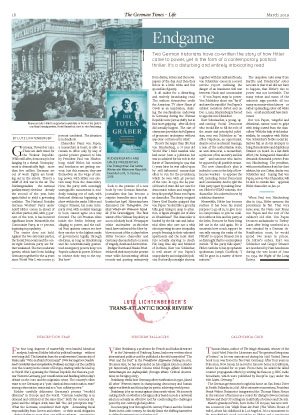Trans-Atlantic Book Review #02
Perception Trap
For four long chapters of masterfully even-handed historical analysis, Andreas Rödder hides his political leanings – without ever being dull. The historian from the southwestern German city of Mainz asks “Who is afraid of Germany?” (Wer hat Angst vor Deutschland? Geschichte eines europäischen Problems) and lays out the conflicts over the country in the center of Europe, starting with the lead-up to World War I, spanning the Weimar Republic, the Nazi era, postwar Western Germany, post-reunification and finishing with today’s debate on the euro and the migration crises. The country’s elites want to see Germany as a “post-classical democratic nation-state” among other nation-states and as a “non-military power.”
Rödder carefully delineates Germany’s present “two-fold dilemma” in Europe and the world: “German leadership is in demand and criticized at the same time.” Both the currency disputes and the refugee crisis have laid “the old perception trap.” What the Germans considered their right – demanding fiscal responsibility from Greece and others – or their moral obligation – giving shelter to more than one million refugees – appeared to outside observers a hegemonic pursuit.
The moderate conservative Rödder ultimately lays his chips on the table, forgoing flashy headlines for well-reasoned policy proposals. No country should continue playing the victim card, Germany included, while being aware of how its actions may be perceived as more aggressive than intended. The country is often in better shape than it realizes – and therefore should maintain its composure while voluntarily investing more in other countries, as did the US with the Marshall Plan of 1948. The EU would do well to adopt a more flexible approach by steering away from the elusive goal of becoming an “ever-closer union.”
Rödder’s book combines a deft scholarly touch with acute political realism. Any country would benefit from being the subject of such a book.
ANDREAS RÖDDER:
Wer hat Angst vor Deutschland? Geschichte eines europäischen Problems, S. Fischer, Frankfurt a.M., S. Fischer, 2018
WESTERN FALLACIES
Volker Steinkamp, a professor for French and Italian literature at the University of Duisburg-Essen, had never written about international politics until he published a forceful essay titled “The West and the Rest” in the Frankfurter Allgemeine Zeitung in 2013. Six years later, he has expounded on his original idea in a slender yet historically profound volume titled Foreign Aff airs: Kritische Betrachtungen zur Außenpolitik (Foreign affairs. Critical observations on foreign policy).
Steinkamp retells how Germany, after reunification in 1990, joined all other Western states in championing democracy and human rights worldwide and thus plays its part in achieving world peace. Steinkamp is by no means against democratic values. He is merely casting doubt on whether a foreign policy based on such a universal axiom is actually an effective tool for confronting the challenges posed by 21st-century global politics.
In a sweeping tour through 18th-century France and the United States in the 20th century, he nimbly limns the shifting narratives to defend interventions on foreign soil.
Today, Steinkamp writes, “‘the universal imperative’ to implement the West’s notion of liberty not only within one’s own societies but to project them into the world” had become part of the conventional wisdom from Europe’s Left all the way to US-American neocons. Steinkamp wants to remind Western politicians of an essential lesson of the Cold War: Keeping the peace while simultaneously securing one’s own freedom and independence should be their “very own and most noble duty.”
Steinkamp has written an elegant treatise on the fallacies of Western thinking about the international order. However, actual decision-makers may fi nd his laudable rationale confusing when formulating foreign policy concerning, for example, China, Russia or Venezuela, where points of contention are too complicated for the simplistic dichotomy of interventionism and non-interventionism
VOLKER STEINKAMP:
Foreign Aff airs. Kritische Betrachtungen zur Außenpolitik,, Vittorio Klostermann, Frankfurt a.M., 2019
CALIFORNIA CRIB
Thomas Mann, author of The Magic Mountain, winner of the 1929 Nobel Prize for Literature and “the greatest living man of letters,” as he was announced during his 1938 United States book tour, was forced to flee Nazi Germany. After four years in Princeton, New Jersey, he moved to his new home in California, where he resided for 10 years. From there, he aided the allied counter-propaganda efforts by writing his famous 55 BBC radio broadcasts, which were published by Knopf in 1943 under the title Listen, Germany.”
The German government bought his home on San Remo Drive in Pacific Palisades in 2016. After extensive renovations, President Frank-Walter Steinmeier inaugurated the Thomas Mann House in the summer of last year as a center for dialog between German fellows and their US colleagues in all fields of science and the arts.
Mann’s grandson Frido, born in the US in 1940, has now written a memoir, Das Weiße Haus des Exils (The White House of exile), about his childhood in Los Angeles. It is a monument to his grandfather’s vocal opposition to Hitler and a passionate plea for ever-closer trans-Atlantic relations in our time of global upheaval.
Before Frido Mann gets to the more uplifting parts, he rips into the US president, calling out his “socially dangerous disregard for decency, the truth, culture and human dignity unprecedented in American history.” It is time to marshal “all remaining resources, drawn from our extraordinary cultural traditions” to counter the nationalist and fundamentalist forces willing to undermine liberal democracy. He hopes the house built “in the spirit of Thomas Mann” will play a vital part in this endeavor.
While Frido Mann’s well-meaning calls for accountability and accommodation are highly laudable, his often stilted and loquacious writing does not serve his cause. Try The Magic Mountain instead.
FRIDO MANN:
Das Weiße Haus des Exils, S. Fischer, Frankfurt a.M., 2018
Lutz Lichtenberger
is senior editor of The German Times.




